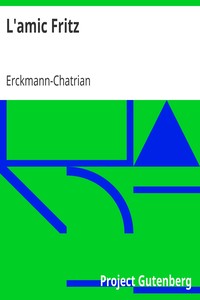L'amic Fritz by Erckmann-Chatrian
"L'amic Fritz" by Erckmann-Chatrian is a novel written in 1864. It follows Fritz Kobus, a wealthy bachelor in a 19th-century German town who has devoted himself to fine dining, good wine, and friendship while firmly rejecting marriage. For fifteen years, he resists pressure from his best friend, a rabbi, who tries to change his mind. Fritz's carefree philosophy seems unshakeable—until a young woman named Süzel enters his life, threatening to upend everything
he believes about himself. (This is an automatically generated summary.)
Read or download for free
| Reading Options | Url | Size | |||
|---|---|---|---|---|---|
| Read now! | https://www.gutenberg.org/ebooks/17819.html.images | 425 kB | |||
| EPUB3 (E-readers incl. Send-to-Kindle) | https://www.gutenberg.org/ebooks/17819.epub3.images | 222 kB | |||
| EPUB (older E-readers) | https://www.gutenberg.org/ebooks/17819.epub.images | 227 kB | |||
| Kindle | https://www.gutenberg.org/ebooks/17819.kf8.images | 403 kB | |||
| older Kindles | https://www.gutenberg.org/ebooks/17819.kindle.images | 379 kB | |||
| Plain Text UTF-8 | https://www.gutenberg.org/ebooks/17819.txt.utf-8 | 377 kB | |||
| Download HTML (zip) | https://www.gutenberg.org/cache/epub/17819/pg17819-h.zip | 218 kB | |||
| There may be more files related to this item. | |||||
Similar Books
About this eBook
| Author | Erckmann-Chatrian |
|---|---|
| Translator | Sitjar, Joan |
| Title | L'amic Fritz |
| Note | Wikipedia page about this book: fr.wikipedia.org/wiki/L%27Ami_Fritz |
| Credits | Produced by Ricard Samarra |
| Reading Level | Reading ease score: 70.0 (7th grade). Fairly easy to read. |
| Language | Catalan |
| LoC Class | PQ: Language and Literatures: Romance literatures: French, Italian, Spanish, Portuguese |
| Subject | France -- History -- 19th century -- Fiction |
| Category | Text |
| EBook-No. | 17819 |
| Release Date | Feb 22, 2006 |
| Copyright Status | Public domain in the USA. |
| Downloads | 238 downloads in the last 30 days. |
| Project Gutenberg eBooks are always free! | |

